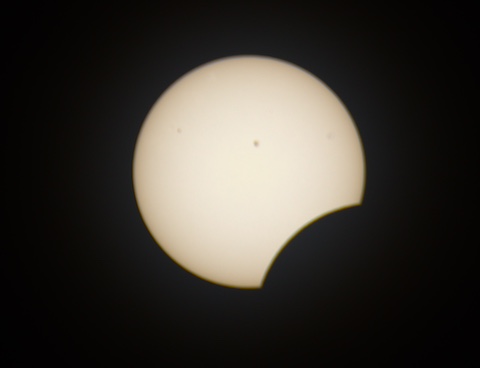On Monday, April 8, 2024, I travelled approximately 260 miles to east central Indiana to view the first total solar eclipse I have seen. I had been looking forward to this event since the last eclipse in 2017 that occurred while I was working at the College of DuPage. I didn’t have the opportunity to get to the path of totality that time and I resolved that the 2024 eclipse would be different.
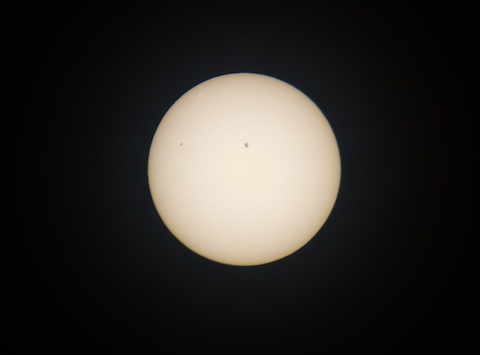
I had studied the path of totality, considered several spots in Illinois and Indiana, purchased a solar filter for my camera, and otherwise made preparations for the big event. I studied techniques for taking pictures both during the partial eclipse and total eclipse phases of the event and developed a game plan for how I would efficiently capture the event with my camera and my cellphone. I also decided that I wanted to experience the eclipse alone, alongside a country road somewhere where I wouldn’t be distracted by other people’s celebrations. I am not generally anti-social, but I believed the eclipse was something that I wanted to experience alone with my thoughts.
As the big day got closer, my anticipation continued to grow. I narrowed down the destinations I was considering to just a few, I had studied the photographic techniques recommended by experts to best capture the eclipse and had read the advice of veteran “eclipse chasers” to not get so caught up in your cameras so that you don’t experience the event itself. Some even said, don’t even try to photograph it and just enjoy the gestalt of the spectacular rare event.
But then, I also began to see stories of the millions of people who were travelling to the path of totality, bringing with them incredible traffic congestion, gridlock at potential viewing sites, and overall general mayhem. I saw stories of shopping centers charging $20 to park in their lots and even one story of a rural church charging $150 per parking space in theirs while also offering patrons the opportunity to buy food and refreshment for an only slightly inflated price, and to buy eclipse souvenirs and eclipse glasses on site. Capitalism was raising its gluttonous head as the eclipse provided an opportunity for local entrepreneurs (both professional and amateur) the opportunity to cash-in. I thought, “Do I really want to subject myself to huge traffic jams, seas of people gathering in huge crowds to view the eclipse, and the wolfish few who are out to make a buck from this event?” On Sunday night I decided I wasn’t going to go. I would go out to my local Bald Eagle nest and photograph them during the partial eclipse here. After all, the 95% coverage here isn’t all that far from totality. How different could it be? I was disappointed, but when I went to bed, I had made up my mind that I would stay local and not make the trek south. It actually took a load off my mind and helped me sleep better.
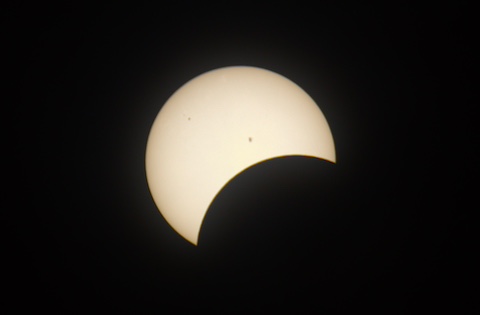
At about 3:45am something woke me up. It could have been a cosmic calling but it was most likely my bladder. When I looked at the clock I thought, “This would be about the time you wanted to get up and go if you were going to go watch the total eclipse.” My next thought was, “No, this is the time you are going to get up and go!” I decided then and there that I would risk facing all the inconveniences that I might encounter to experience a once in a lifetime event. I quickly dressed, got my stuff together, and piled into my car and headed south!
I decided I would take secondary roads as I made my way toward my destination: Muncie, Indiana. I figured Muncie was a little smaller area that also had a major university (Ball State) if I decided to go against my instincts and attend a planned event to view the eclipse. I knew Ball State had made plans to sponsor a viewing party of sorts and while I didn’t really want to participate in that, I thought I should keep my options open. It was also located near the middle of the path of totality which would provide nearly four minutes of darkness as the moon’s penumbra passed overhead. For the first few hours, I travelled on roads that I had taken before. I crossed over the Illinois, Vermillion, and Wabash rivers and countless streams with and without names. As dawn broke in the east, I started to see birds stirring and even saw an osprey along a small lake near the tiny town of Potomac, Illinois. Traveling along lonely country roads is one of my favorite pastimes at any time, and travelling through areas on those kinds of roads where I hadn’t been before was all the better. The journey, in these cases, is often better than the destination. Today though, while the journey was wonderful, the ultimate destination was one that couldn’t be topped: the glory of a total solar eclipse.
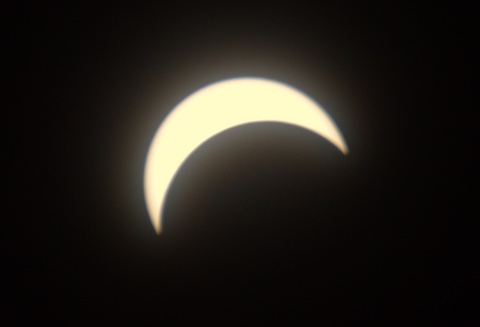
After about five hours of very pleasant driving, I arrived on the outskirts of Muncie about 4 hours before totality was to begin. I had encountered almost no traffic, but I attributed that to my taking all the back roads. As I entered town, I was expecting to see large crowds of people getting ready to view the celestial show. But they weren’t there. I travelled up and down the streets of downtown Muncie and saw very few people walking or driving around.
I decided I would try to find the campus of Ball State University. You wouldn’t think it would be too difficult for me to accomplish this, but it was. I finally turned off a main street and headed west and found myself in front of a frat house. I thought that was a good sign and, in a block, I was in the middle of the campus. As I kept heading west on this street, I came across a “Road Closed” barrier and turned left into a university parking lot to turn around and find another way. As I entered the parking lot, I noticed a large sign that read “Planetarium Open Today.” I had inadvertently entered the parking lot for the Charles H. Brown Planetarium of Ball State University. I thought, “What a coincidence. I’m here for an eclipse and serendipitously ended up at the planetarium.” I had time, so I parked and went in. In the lobby of the planetarium, three young people sat behind a long table and welcomed me warmly. I talked to them and found that their planetarium had a 16 meter dome: exactly the same size as the one that my faculty and I had proposed to be built at the College of DuPage. I mentioned this to the students at the table and one of them said they were members of the Great Lakes Astronomical Society and their group visited planetariums all over the Midwest. I told her I was familiar with that organization and asked her if she knew Joe D., the Astronomy Professor from College of DuPage. She got a funny look on her face and said, “I don’t know him personally, but I’ve heard of him.” I thought – what a coincidence. I ended up on the campus of Ball State, accidentally pulled into a random parking lot that turned out to be for the planetarium that happened to be open, I went in, and met someone who knew a professor who taught at a school 250 miles away. I asked her where she was from and she replied, “A little town in Illinois that you’ve probably never heard of: Winthrop Harbor.” I said not only had I heard of Winthrop Harbor but had visited quite a few times and liked a restaurant called “the Lighthouse” there. She was very surprised and told me that was her favorite restaurant, but it had closed. We both commented on the coincidences and chalked it up to it being a small world.
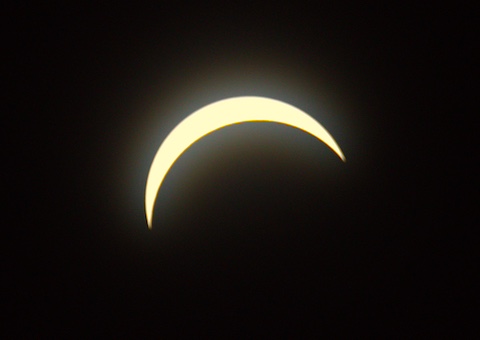
of the Sun’s disc is blocked by the Moon.
The anticipation of seeing totality is building for me!
This was just the first of quite a few coincidences that occurred that day. Other friends I knew through the College of DuPage camped at a state park near Carbondale and happened to be in the campsite next to Tom Skilling, the venerable, recently retired meteorologist for WGN in Chicago! They said that Skilling was ten times as nice in person as he was on TV (and that was very nice) and talked to their kids for hours about science and was just a delightful person. Another coincidence.
Another of my friends who was a professor at COD when I was there and had since moved on to NIU, took his family south for the eclipse. He didn’t know exactly where they were going to end up but settled on a small airport outside the small town of Mount Carmel, Illinois. As he set up a picnic for his family in the parking lot of the airport, he noticed another car pulling in that parked a couple hundred feet away. When he looked at the person who got out of the car, it was a friend that he had gone to school with many years before who had brought his family to southern Illinois for the eclipse from North Dakota! They too didn’t have a specific destination in mind and ended up at the same little obscure airport parking lot simply by random chance. Another huge coincidence.
The event that we were all there to witness was the result of an amazing cosmic coincidence. Total solar eclipses only occur on planet Earth within our solar system because of an amazing confluence of factors, including the size of the Moon and the Sun and their respective distances from the Earth. The Sun’s diameter is 400 times that of the Moon, but the Sun is 400 times farther away than the Moon, so the apparent size of the Moon and the Sun are identical, and the Moon perfectly blocks out the disc of the Sun when all the other factors that are required for an eclipse line up. A truly amazing coincidence that hasn’t been observed anywhere but on our humble home planet.
The final and perhaps most remarkable coincidence is that we are here as citizens of planet Earth and are able to view this celestial coincidence. So far, we don’t know of any sentient life on any other planet in the known universe and we know of an increasingly vast number of planets thanks to our scientific advancements. Life seems to be a very rare and precious commodity in the universe. When you think about it, the cosmic coincidences that occurred to make it possible for human beings to exist and for a solar eclipse to happen, the odds against it happening are staggering.
After I left the planetarium, I headed into the countryside northeast of Muncie. I found a little turnout on a quiet country road just southeast of the town of Albany and set up my tripod and camera and waited for the eclipse to begin. I had a clear view of fields and a few woods to the southwest: the direction that the Moon’s shadow would approach from. I started taking pictures of the Sun about ten minutes before the scheduled start of the eclipse. I wanted to get a sequence of shots from the very beginning of the partial eclipse all the way through totality.
My preparations paid off as I kept the Sun in the field of view of my camera for the entire time of the partial eclipse. As totality approached, I began taking video with my cell phone as I wanted to capture the shadow of the Moon passing my location at 1600 miles per hour! Just before totality, a shadow did pass at a tremendous speed that wasn’t visible on the video. I felt it though! I said, “Whoa!!!” as it went by. I can’t explain what I felt but it was definitely something. I watched the sliver of the sun finally disappear from the LCD screen on my camera and I unscrewed the solar filter from my lens so I could get shots of the Sun’s corona as the Moon completely covered the Sun’s disc. I continued to hold my cellphone in one hand while I removed the solar filter from my camera. I’m glad I did as the video captured my stunned response when I first saw the Sun’s corona on the LCD screen of my camera. “My God!”, I exclaimed. And then I looked up. The sight that met my eyes was unlike anything I have ever seen before and unlike anything I’ll ever see again. “My God and My Lord” were the only things I could say. It was the most incredible thing I have ever seen! My words and pictures can’t begin to do justice to the sublime sight of that moment. As I write this and relive the experience, I have tears in my eyes: the moment was that powerful. I know that I’m not the only one who experienced these powerful, visceral emotions as the Moon covered the Sun for nearly four minutes.
I’ve since heard the experiences of others that had similarly powerful emotional experiences. I know others, particularly those outside of the path of totality, didn’t have the same experience. I tested one of my friends who was outside of the path of totality after the penumbra had passed and I was putting away my camera and tripod: I told him I was shaking so much that it was difficult for me to perform those simple tasks. He said, “Why are you shaking?” I could only reply that you’d understand if you had seen what I just saw. At that moment, I knew that I had made the right decision to travel to this site. Had I not seen what I saw, I wouldn’t believe it. Even though I rationally know what happens during a solar eclipse, there is a mystical quality to it that I can’t explain, and unless you’ve seen it, you can’t really understand. On the drive down, I heard an astronomer interviewed on the radio who was seeing a total solar eclipse for the 17th time in his life. The reporter asked him, “Why do you keep coming to see these things?” He replied, “You’ve never seen one before, have you?” The reporter answered “No.” The old astronomer said come back to me in a few hours, after the eclipse, I think you’ll know the answer without asking me again.” I now knew exactly what he meant.
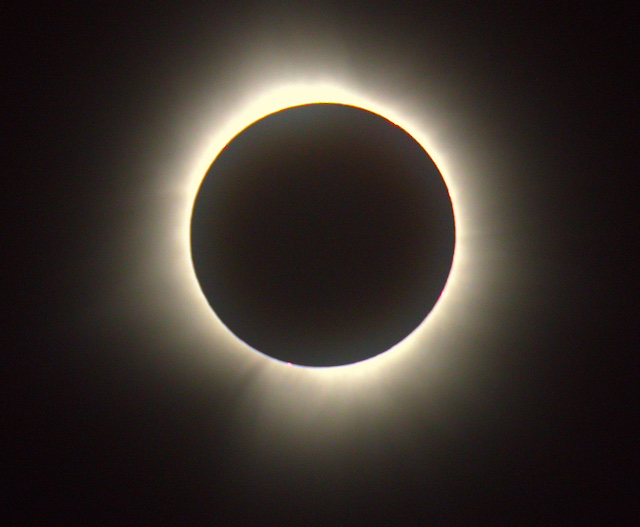
Those of you that know me know that I’m a guy that puts a lot of faith in science to explain the vagaries of the universe and nature. I’m not one to attribute unusual occurrences in nature to mystical or supernatural forces. But this eclipse had an undeniably spiritual component to it for me. When I think about the slim odds of our little rock orbiting the Sun to host all kinds of life (including us) and then being host to a phenomenon like an eclipse, it’s difficult to explain or understand in totally logical terms. Whether we believe in the Divine Hand of God orchestrating the happenings in our universe or simply the Earth and its denizens being the lucky winners of a cosmic lottery (with much slimmer odds of winning), we should be aware how special life on our wonderful planet Earth, our home, truly is.
Experiencing the eclipse has made me realize how unusual and fragile our existence is here on planet Earth. It’s encouraged me to value every day a little more, to care about my friends and family a little more, and to care about all other residents living on our planet a little more. These residents include the animals and plants and all living things that share our little island of life in the vastness of space. The eclipse has also encouraged me to redouble my efforts to help natural areas to flourish and not be subsumed for temporal gain. It’s up to all of us to be good stewards of our planetary ecosystem and do everything we can to cultivate a spirit of ecology within our society. We need to take care of our Earth as it’s the only place we have.
Coincidences sometimes make us say, “It’s a small world.” I’ve done it already in this column. It really is a small world though, in an enormous universe. Relatively small effects can have really big impacts, either good or bad. Doing something good for nature in your neighborhood can have a big effect if enough of us work together in a like manner. Someone once said, “Think globally, act locally” to effect positive change. If enough of us follow this mantra, we can help our Earth to continue to maintain a lovely home for all creation. If not, the outlook is not so positive. Our children are watching and counting on us to do the right thing.
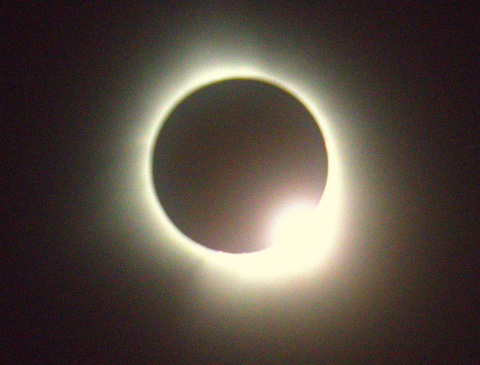
The bright shining rays of the Sun shining around the dark disk of the Moon is called “the diamond ring.” If you look closely, some small red blotches on the Sun’s corona are solar prominences that extend thousands and thousands of miles into space away from the Sun.

